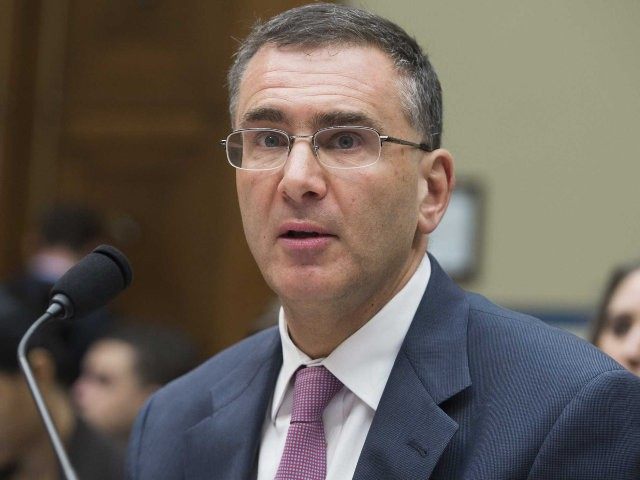Most observers of the legal battle over Obamacare’s subsidies are now familiar with the two clips (one video and one audio) in which economist Jonathan Gruber takes the plaintiff’s side, saying only states which set up an exchange will receive subsidies. But a third example of Gruber saying much the same thing has, so far, received very little attention.
Rich Weinsten, the financial adviser who found the video of Gruber last year, has identified a published interview dated March 2013 in which Gruber seems to recapitulate, at least in part, his comments about states posing a threat to the law’s success. While Gruber doesn’t clearly state the relationship between state exchanges and subsidies as he did in the previous clips, he does allude to a “cost” to state residents that will be imposed in those states not setting up an exchange. Here is what Gruber said in a March 2013 interview with Employee Benefit Adviser magazine:
I think the piece that isn’t going so well is the next step with states. A number of states have done a great job and are getting ready to go for 2014. But a lot of states are uncertain and there are other states that are, unfortunately, playing a terrible political game at the cost of their state residents in not developing exchanges.
Which states, specifically?
In terms of moving the legislative process forward, California, Maryland and Connecticut come to mind. Massachusetts was already there, of course. There are probably 10 states total that are ready for opening exchanges. Then there are the ones that are part of the large middle group that are sort of tip-toeing around legislation and preparedness for the law. The last group is the one that’s the most worrisome to me. They’re the states that are those stick-it-to-the-man conservative states that are trying to make political hay out of doing nothing.
Now compare that to his statement from January 10, 2012, about the need for states to set up exchanges lest they cost their residents access to subsidies:
Through a political compromise, the decision was made that states should play a critical role in running these health insurance exchanges. And the health insurance exchanges are the centerpiece of this reform, because they are the place that individuals can go to shop for their new, securely priced health insurance. But if they’re not set up in a way which is transparent, and which is convenient for shoppers, and which allows people to take their tax credits, and use them to effectively buy health insurance, it will undercut the whole purpose of the bill. Now a number of states have expressed no instance in doing so. A number of states like California has been a real leader. I think it was the first state to set up an exchange bill. It’s been a leader in setting up its exchange. It’s a great example. But California is rare. Only about 10 states have moved forward aggressively in setting up their exchanges. A number of states have even turned down millions of dollars in federal government grants as a statement of some sort, that they don’t support health reform.
I guess I’m enough of a believer in democracy to think that—when the voters in states see that by not setting up an exchange, the politicians of the state are costing state residents hundreds and millions and billions of dollars—that they’ll eventually throw the guys out, but I don’t know that for sure. And that is really the ultimate threat is will people understand that, gee, if your governor doesn’t set up an exchange, you’re losing hundreds of millions of dollars of tax credits to be delivered to your citizens. So that’s the other threat is will states do what they need to to set it up.
There are a number of clear similarities in these two statements. In both cases, Gruber is talking about states which have or have not embraced Obamacare’s exchanges. In both, he notes that “10 states” including California have moved forward aggressively. He also notes that some states are “doing nothing.” Those are the states he describes as “worrisome” in the 2013 statement and as a “threat” in the 2012 statement.
Gruber does not spell out what will happen in those states which fail to set up an exchange in the 2013 interview. Nevertheless, he does say these states are “playing a terrible political game at the cost of their state residents in not developing exchanges.” What cost to residents is he describing?
One possible explanation is the same one that he gave in January 2012 (i.e. residents of states without exchanges would not receive subsidies). Given how similar the rest of his 2012 and 2013 statements are, that seems like a plausible reading.

COMMENTS
Please let us know if you're having issues with commenting.